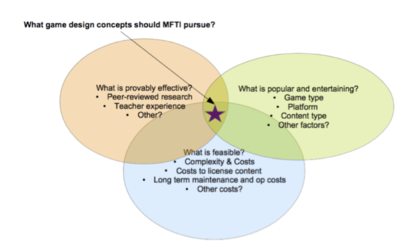Difference between revisions of "Learning Game Classification and Development"
Bill.mciver (talk | contribs) (Created page with "Category:Redesign2017 // Place. Standard NBCC.ca Header here // ---- = [Project title] = // [ One line abstract ] // '''Research topics''' ''[keywords]'' // [Abstr...") |
Bill.mciver (talk | contribs) |
||
| Line 6: | Line 6: | ||
= [Project title] = | = [Project title] = | ||
| − | + | The NBCC Mobile First Technology initiative conducted two rapid, inter-related studies between April and June 2016 to identify state-of-the-art game design development methods and design heuristics, and attempt to identify design characteristics common to recent successful K-12 educational games for mobile platforms. | |
'''Research topics''' | '''Research topics''' | ||
| − | '' | + | ''game design heuristics, learning games, mobile games'' |
| + | ---- | ||
| + | MFTI became involved in applied research activities relating to the development of learning games, both independently and with industrial partners. This project is part of an ongoing process with partner First Mobile Education to accomplish the following: | ||
| + | * Identify critical factors in current game design concepts that have are novel and have been shown to be educationally effective, and commercially successful; and | ||
| + | * Provide a well-defined process and guidelines for designing and implementing educational games. | ||
| − | + | This work was motivated by the notion that game development should not be carried out in an ad hoc given several realities: | |
| + | * The maturity of the field of game design; | ||
| + | * The critical nature of design in the educational domain; and | ||
| + | * The resource constraints of the Mobile First Technology Initiative (MFTI) and the small and medium-sized enterprises with which it is collaborating. | ||
| − | ''' | + | The key findings of our work in this area thus far are as follows: |
| − | + | * Games seem to be distributed across a variety of learning objectives as classified by the Revised Bloom Taxonomy. | |
| + | * Multi-player games seem to be under-represented in the learning games category as classified by the Lecture Games Taxonomy. | ||
| + | * A more formal survey of games must be undertaken. There appear to be inconsistencies between our classifications using the Lecture Games and Revised Bloom Taxonomies. | ||
| + | |||
| + | [[File:Nbcc_ca_mobi_diag-objectives.png | 400px ]] | ||
| + | |||
| + | ---- | ||
| + | |||
| + | '''Other information''' | ||
| + | * W. McIver Jr., Learning Game Development For The Mobile First Technology Initiative: A Preliminary Study Of Methods, Processes, Heuristics, And Market Opportunities, New Brunswick Community College – Mobile First Technology initiative, Working Paper, 2016-07-12 [https://www.dropbox.com/s/c758fb8h8wbaniu/tr-MFTI-GameDev-2017-04-13.pdf?dl=0 PDF] | ||
| + | |||
| + | '''Client–Collaborators''' | ||
| + | * Gary Stairs, CEO, First Mobile Education, Fredericton, New Brunswick | ||
'''Funders''' | '''Funders''' | ||
* | * | ||
| − | |||
| − | |||
| − | |||
| − | |||
| − | |||
| − | |||
| − | |||
| − | |||
| − | |||
'''Project contact''' | '''Project contact''' | ||
Revision as of 14:50, 13 April 2017
// Place. Standard NBCC.ca Header here //
[Project title]
The NBCC Mobile First Technology initiative conducted two rapid, inter-related studies between April and June 2016 to identify state-of-the-art game design development methods and design heuristics, and attempt to identify design characteristics common to recent successful K-12 educational games for mobile platforms.
Research topics
game design heuristics, learning games, mobile games
MFTI became involved in applied research activities relating to the development of learning games, both independently and with industrial partners. This project is part of an ongoing process with partner First Mobile Education to accomplish the following:
- Identify critical factors in current game design concepts that have are novel and have been shown to be educationally effective, and commercially successful; and
- Provide a well-defined process and guidelines for designing and implementing educational games.
This work was motivated by the notion that game development should not be carried out in an ad hoc given several realities:
- The maturity of the field of game design;
- The critical nature of design in the educational domain; and
- The resource constraints of the Mobile First Technology Initiative (MFTI) and the small and medium-sized enterprises with which it is collaborating.
The key findings of our work in this area thus far are as follows:
- Games seem to be distributed across a variety of learning objectives as classified by the Revised Bloom Taxonomy.
- Multi-player games seem to be under-represented in the learning games category as classified by the Lecture Games Taxonomy.
- A more formal survey of games must be undertaken. There appear to be inconsistencies between our classifications using the Lecture Games and Revised Bloom Taxonomies.
Other information
- W. McIver Jr., Learning Game Development For The Mobile First Technology Initiative: A Preliminary Study Of Methods, Processes, Heuristics, And Market Opportunities, New Brunswick Community College – Mobile First Technology initiative, Working Paper, 2016-07-12 PDF
Client–Collaborators
- Gary Stairs, CEO, First Mobile Education, Fredericton, New Brunswick
Funders
Project contact
William McIver Jr.
